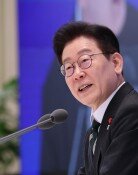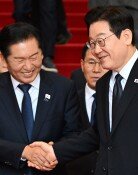Improving Publics Livelihood Is New Presidents Main Priority
Improving Publics Livelihood Is New Presidents Main Priority
Posted December. 20, 2007 14:58,
President-elect Lee Myung-bak from the Grand National Party plans to speed up his efforts to reinvigorate the nations economy right after his election victory is declared in an attempt to live up to his image as an economy president, which was emphasized during his election campaign. That is a key to the LMB influence, and one of the best ways for him to overcome political hurdles that are likely to come from an independent probe into his alleged involvement in stock price manipulation.
To that end, president-elect Lee will place priority on improving peoples living standards, revamping bloated pubic sectors, and establishing friendly business environments, while sticking to his main election pledge of Koreas 747 vision referring to achieving economic growth of 7 percent, per capita income of 40,000 dollars, and the worlds seventh largest economy, the creation of 3 million jobs, and the construction of a grand canal. Through these plans, Lees camp wants to show the public the kernel of Lee Myung-baks economic recovery strategy.
Lee intends to place the economy, which has deteriorated under the Roh Moo-hyun administration, on track as quickly as possible, and reform lax and disproportionately bloated public sectors at the same time, thereby paving the way for further economic reform.
Raising the proportion of the middle-class to 70 percent-
First, the president-elect is planning to reduce the publics main living expenses such as oil, communications, medicine, and private education costs by around 30 percent. With the reduction, households that are classified as working class in 2007 could save 440,000 won monthly and 5.3 million won annually.
In the case of oil expenses, people will see the transportation tax levied on diesel and gasoline and the special consumption tax on kerosene cut by 10 percent each. In addition, the special consumption tax on LPG fuel, which taxis run on, will be eliminated, and the special tax on vehicles for the disabled and the education tax are likely to be repealed as well.
The new government will also revamp the expressway toll system which has caused trouble on big holidays, reduce tolls charged to drivers on such roads where investment has already been recouped and tolls are unreasonably high, and expand the "highpass system" nationwide.
With regard to child-rearing, which is one of the biggest issues double-income households deal with, the president-elect made it clear that the government would foot the bill of raising children under the age of six.
Along with those plans, Lee promised to come up with various measures for small merchants in traditional markets and the self-employed who bear the brunt of the economic downturn. Among them are decreasing credit card transaction fees for small merchants from the current 3 to 5 percent to 1.5 percent, analyzing the influence of big-sized discount stores on local small shopkeepers, and pushing for micro-credit, that refers to offering small loans without collateral requirements.
In the next administration, I will preside over a meeting aimed at recovering lower class livelihoods and set up a department in charge of public livelihoods, the president-elect said to reporters recently. He also promised to increase the number of middle-class households from the current 50 percent to 70 percent during this term in office.
There are other measures to help boost public livelihoods in the works, including the expansion of expenses subjected to tax deductions to education, medical, and house purchase costs, and comprehensive property tax and capital gains tax cuts for owners who have held one house for a long time. These plans will reduce the working class tax burden by 4.2 trillion won.
Public sector reform will be the groundwork for economic reform-
I will reform the public sector, where workers are lazy and shirk responsibilities, said Lee in an interview with the press, including this newspaper. Pundits generally agree that these remarks manifest his perception that the public sector is currently run counter to business pragmatism and some of the funding earmarked for this sector can be used to reinvigorate the economy.
Lee plans to consolidate and streamline the current government and keep the total number of public officials standing at 950,000 (including those in local government). In other words, he wants to transform the big and bloated government into a small and effective one. Various committees haphazardly set up by the present government will be scrapped.
Kim Hyeong-oh, who heads a GNP committee for helping Korea join the ranks of advanced countries, explained, We consulted experts on eliminating and consolidating overlapping organizations. According to envisioned plans, the national budget will drop around 10 percent. (This figure was estimated based on this years budget of 20 trillion won.)
Public companies, which are often called a workplace given by god and considered to symbolize poor management, will be subject to a major overhaul. An official close to Lee said, A report on 24 public enterprises revealed that their debts have risen by 74 percent while the number of staffers increased by 64 percent since President Roh took office, and added that the new government will push for a reform of public companies by privatizing them gradually, starting with the bigger ones. Officials in the Lee camp are considering the way Singapores government privatized management only, while the government held companies shares.
In an attempt to root out bribery, they are also considering punishing public officials for accepting bribes by levying fines 50 times the amount of the bribes in addition to subjecting them to criminal penalties.
ddr@donga.com




![[속보]법원 “12·3 계엄은 내란…한덕수, 절차적 요건 갖추게 해”](https://dimg.donga.com/c/138/175/90/1/wps/NEWS/IMAGE/2026/01/21/133201789.1.jpg)

![‘50만원짜리 김밥’ 알고보니…환불 반복에 자영업자 폭발했다[e글e글]](https://dimg.donga.com/c/138/175/90/1/wps/NEWS/IMAGE/2026/01/21/133200737.3.jpg)
